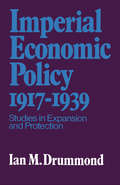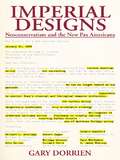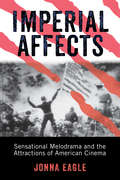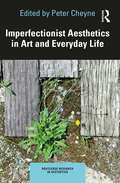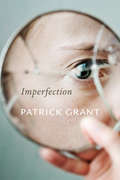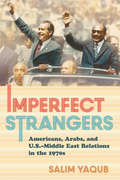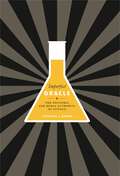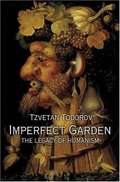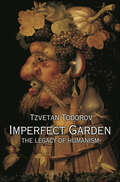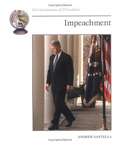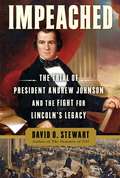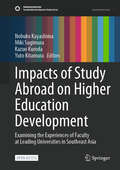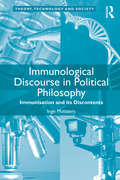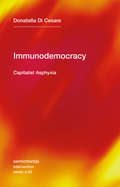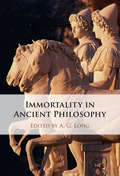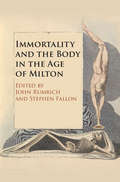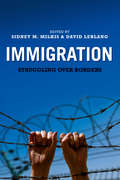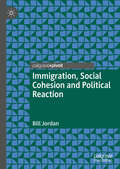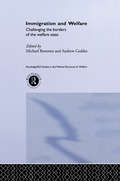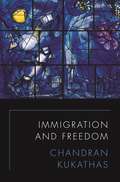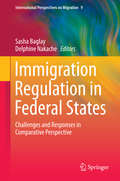- Table View
- List View
Imperial Economic Policy 1917-1939
by Ian DrummondThis book offers a detailed account, based on primary source materials from Britain, Canada, and Australia, of the process by which the Empire settlement programme and the Ottawa Agreements were devised. It also traces the effects of both, placing them in the general contexts of British economic policy-making, imperial economic diplomacy and the contemporary concern with economic imperialism. Its special merits are twofold: a solid base in the documents and a development of the historical arguments and assessments with the aid of economic analysis. It should appeal to anyone who is interested in British political and economic history, or in Commonwealth history, especially in the twentieth century.
Imperial Designs: Neoconservatism and the New Pax Americana
by Gary DorrienThis work argues that the influence of neoconservatives has been none too small and all too important in the shaping of this monumental doctrine and historic moment in American foreign policy. Through a fascinating account of the central figures in the neoconservative movement and their push for war with Iraq, he reveals the imperial designs that have guided them in their quest for the establishment of a global Pax Americana.
Imperial Affects: Sensational Melodrama and the Attractions of American Cinema
by Jonna EagleImperial Affects is the first sustained account of American action-based cinema as melodrama. From the earliest war films through the Hollywood Western and the late-century action cinema, imperialist violence and mobility have been produced as sites of both visceral pleasure and moral virtue. Suffering and omnipotence operate as twinned affects in this context, inviting identification with an American national subject constituted as both victimized and invincible—a powerful and persistent conjunction traced here across a century of cinema.
Imperfectionist Aesthetics in Art and Everyday Life (Routledge Research in Aesthetics)
by Peter CheyneThis book presents interdisciplinary research on the aesthetics of perfection and imperfection. Broadening this growing field, it connects the aesthetics of imperfection with issues in areas including philosophy, music, literature, urban environment, architecture, art theory, and cultural studies. The contributors to this volume argue that imperfection has value in being open and inclusive. The aesthetics of imperfection is typified by organic, unpolished production and the avoidance of perfect finish, instead representing living and natural change, and opposing the consumerist concern with the flawless and pristine. The chapters are divided into seven thematic sections. After the first section, on imperfection across the arts and culture, the next three parts are on imperfection in the arts of music, visual and theatrical arts, and literature. The second half of this book then moves to categories in everyday life and branches this further into body, self, and the person, and urban environments. Together, the chapters promote a positive ethos of imperfection that furthers individual and social engagement and supports creativity over mere passivity. Imperfectionist Aesthetics in Art and Everyday Life will appeal to a broad range of scholars and advanced students working in philosophical aesthetics, literature, music, urban environment, architecture, art theory, and cultural studies.
Imperfection
by Patrick Grant“…aspirations to perfection awaken us to our actual imperfection.” It is in the space between these aspirations and our inability to achieve them that Grant reflects upon imperfection. Grant argues that an awareness of imperfection, defined as both suffering and the need for justice, drive us to an unrelenting search for perfection, freedom, and self-determination. The twenty-one brief chapters of Imperfection develop this governing idea as it relates to the present situation of the God debate, modern ethnic conflicts, and the pursuit of freedom in relation to the uncertainties of personal identity and the quest for self-determination. Known for his exploration of the relationship between Buddhism and violent ethnic conflict in modern Sri Lanka, as well as his contribution to the study of Northern Ireland and the complex relationships among religion, literature, and ethnicity, Grant provides the reader with an analysis of the widespread rise of religious extremism across the globe. Referencing Plato, Van Gogh, Jesus, and the Buddha, he enlightens the reader with both succinct and original insights into human society. Imperfection is the result of an important Canadian public intellectual at work.
Imperfect Strangers: Americans, Arabs, and U.S.–Middle East Relations in the 1970s
by Salim YaqubIn Imperfect Strangers, Salim Yaqub argues that the 1970s were a pivotal decade for U.S.-Arab relations, whether at the upper levels of diplomacy, in street-level interactions, or in the realm of the imagination. In those years, Americans and Arabs came to know each other as never before. With Western Europe's imperial legacy fading in the Middle East, American commerce and investment spread throughout the Arab world. The United States strengthened its strategic ties to some Arab states, even as it drew closer to Israel. Maneuvering Moscow to the sidelines, Washington placed itself at the center of Arab-Israeli diplomacy. Meanwhile, the rise of international terrorism, the Arab oil embargo and related increases in the price of oil, and expanding immigration from the Middle East forced Americans to pay closer attention to the Arab world.Yaqub combines insights from diplomatic, political, cultural, and immigration history to chronicle the activities of a wide array of American and Arab actors—political leaders, diplomats, warriors, activists, scholars, businesspeople, novelists, and others. He shows that growing interdependence raised hopes for a broad political accommodation between the two societies. Yet a series of disruptions in the second half of the decade thwarted such prospects. Arabs recoiled from a U.S.-brokered peace process that fortified Israel’s occupation of Arab land. Americans grew increasingly resentful of Arab oil pressures, attitudes dovetailing with broader anti-Muslim sentiments aroused by the Iranian hostage crisis. At the same time, elements of the U.S. intelligentsia became more respectful of Arab perspectives as a newly assertive Arab American community emerged into political life. These patterns left a contradictory legacy of estrangement and accommodation that continued in later decades and remains with us today.
Imperfect Oracle: The Epistemic and Moral Authority of Science (G - Reference, Information and Interdisciplinary Subjects)
by Theodore L. BrownScience and its offshoot, technology, enter into the very fabric of our society in so many ways that we cannot imagine life without them. We are surrounded by crises and debates over climate change, stem-cell research, AIDS, evolutionary theory and “intelligent design,” the use of DNA in solving crimes, and many other issues. Society is virtually forced to follow our natural tendency, which is to give great weight to the opinions of scientific experts. How is it that these experts have come to acquire such authority, and just how far does their authority reach? Does specialized knowledge entitle scientists to moral authority as well? How does scientific authority actually function in our society, and what are the countervailing social forces (including those deriving from law, politics, and religion) with which it has to contend? Theodore Brown seeks to answer such questions in this magisterial work of synthesis about the role of science in society. In Part I, he elucidates the concept of authority and its relation to autonomy, and then traces the historical growth of scientific authority and its place in contemporary American society. In Part II, he analyzes how scientific authority plays out in relation to other social domains, such as law, religion, government, and the public sphere.
Imperfect Garden: The Legacy of Humanism
by Tzvetan TodorovAvailable in English for the first time, Imperfect Garden is both an approachable intellectual history and a bracing treatise on how we should understand and experience our lives. In it, one of France's most prominent intellectuals explores the foundations, limits, and possibilities of humanist thinking. Through his critical but sympathetic excavation of humanism, Tzvetan Todorov seeks an answer to modernity's fundamental challenge: how to maintain our hard-won liberty without paying too dearly in social ties, common values, and a coherent and responsible sense of self. Todorov reads afresh the works of major humanists--primarily Montaigne, Rousseau, and Constant, but also Descartes, Montesquieu, and Toqueville. Each chapter considers humanism's approach to one major theme of human existence: liberty, social life, love, self, morality, and expression. Discussing humanism in dialogue with other systems, Todorov finds a response to the predicament of modernity that is far more instructive than any offered by conservatism, scientific determinism, existential individualism, or humanism's other contemporary competitors. Humanism suggests that we are members of an intelligent and sociable species who can act according to our will while connecting the well-being of other members with our own. It is through this understanding of free will, Todorov argues, that we can use humanism to rescue universality and reconcile human liberty with solidarity and personal integrity. Placing the history of ideas at the service of a quest for moral and political wisdom, Todorov's compelling and no doubt controversial rethinking of humanist ideas testifies to the enduring capacity of those ideas to meditate on--and, if we are fortunate, cultivate--the imperfect garden in which we live.
Imperfect Garden: The Legacy of Humanism
by Tzvetan TodorovAvailable in English for the first time, Imperfect Garden is both an approachable intellectual history and a bracing treatise on how we should understand and experience our lives. In it, one of France's most prominent intellectuals explores the foundations, limits, and possibilities of humanist thinking. Through his critical but sympathetic excavation of humanism, Tzvetan Todorov seeks an answer to modernity's fundamental challenge: how to maintain our hard-won liberty without paying too dearly in social ties, common values, and a coherent and responsible sense of self. Todorov reads afresh the works of major humanists--primarily Montaigne, Rousseau, and Constant, but also Descartes, Montesquieu, and Toqueville. Each chapter considers humanism's approach to one major theme of human existence: liberty, social life, love, self, morality, and expression. Discussing humanism in dialogue with other systems, Todorov finds a response to the predicament of modernity that is far more instructive than any offered by conservatism, scientific determinism, existential individualism, or humanism's other contemporary competitors. Humanism suggests that we are members of an intelligent and sociable species who can act according to our will while connecting the well-being of other members with our own. It is through this understanding of free will, Todorov argues, that we can use humanism to rescue universality and reconcile human liberty with solidarity and personal integrity. Placing the history of ideas at the service of a quest for moral and political wisdom, Todorov's compelling and no doubt controversial rethinking of humanist ideas testifies to the enduring capacity of those ideas to meditate on--and, if we are fortunate, cultivate--the imperfect garden in which we live.
Imperatives
by Mikhail Kissine Mark JaryImperative sentences usually occur in speech acts such as orders, requests, and pleas. However, they are also used to give advice, and to grant permission, and are sometimes found in advertisements, good wishes and conditional constructions. Yet, the relationship between the form of imperatives, and the wide range of speech acts in which they occur, remains unclear, as do the ways in which semantic theory should handle imperatives. This book is the first to look systematically at both the data and the theory. The first part discusses data from a large set of languages, including many outside the Indo-European family, and analyses in detail the range of uses to which imperatives are put, paying particular attention to controversial cases. This provides the empirical background for the second part, where the authors offer an accessible, comprehensive and in-depth discussion of the major theoretical accounts of imperative semantics and pragmatics.
Impeachment (Cornerstones of Freedom)
by Andrew SantellaSurveys the history of impeachment in the United States, discussing the basic rules and procedures and notable officials who have been impeached.
Impeached: The Trial of President Andrew Johnson and the Fight for Lincoln's Legacy
by David O. StewartAfter the Civil War, the nation came close to tearing itself apart, again, during the impeachment struggle between Congress and President Andrew Johnson in the spring of 1868.
Impacts of Study Abroad on Higher Education Development: Examining the Experiences of Faculty at Leading Universities in Southeast Asia (Sustainable Development Goals Series)
by Yuto Kitamura Kazuo Kuroda Nobuko Kayashima Miki SugimuraThis open-access book is an exceptional contribution to the burgeoning fields of higher education development and higher education internationalization as it empirically examines the impact of the study abroad experiences of faculty members on individual and institutional development. The research and its outcomes presented here utilize results from a large-scale survey and interviews of faculty at ten leading universities in Malaysia, Indonesia, Vietnam, and Cambodia. The analyses show that the study abroad experiences of faculty members impact not only improvements in research quality and development of educational programs but also serve as the foundation for international activities at the university, crucially important in today’s higher education landscape. On the other hand, the research reveals the rapid development of higher education at the local and regional levels including the development of graduate programs for faculty training in the home country leading to increasing rates of study abroad within Southeast Asia. Through the analyses presented, this book offers a new understanding of higher education development and internationalization in Southeast Asia by examining the impact of study abroad on the academic profession, higher education institutions and the higher education sector.
Immunological Discourse in Political Philosophy: Immunisation and its Discontents (Theory, Technology and Society)
by Inge MutsaersGiven the propensity of contemporary protection measures such as counterterrorism efforts and fierce protection strategies against viral threats, as well as physical and legal barriers against migration, a number of political philosophers, including Peter Sloterdijk and Roberto Esposito, have claimed that contemporary (political) culture can be characterised by a so-called ’immunisation paradigm’. This book critically examines the intricate entanglement between biological immunological notions and their political philosophical appropriation, whilst studying the ’immunisation response’ to recent viral threats, including the Swine Flu pandemic of 2009 and the lab-bred Avian flu threat of 2012, to analyse immunisation as a biopolitical strategy. Offering insights into to the polarising tendencies in contemporary political culture resulting from the appropriation of immunological concepts in political thought, the author also shows how political philosophers tend to build on purely defensive understandings of immunity. As such, Immunological Discourse in Political Philosophy constitutes a theoretically sophisticated critique of the ’semantic trap’ caused by the use of immunological concepts in political philosophy. Arguing for a more versatile and less defensive immunological repertoire, which allows for the development of alternative and less polarised forms of political debate, this book will appeal to scholars of political theory, sociology, philosophy and science and technology studies.
Immunodemocracy: Capitalist Asphyxia (Semiotext(e) / Intervention Series #30)
by Donatella Di CesareA stimulating and profound portrayal of the epochal event that has already left its mark on the twenty-first century.Immunodemocracy offers a stimulating and profound portrayal of the epochal event that has already left its mark on the twenty-first century. Moving from the ecological question to the rule of experts, from the state of exception to immunitarian democracy, from rule by fear to the contagion of conspiracy theory, from forced distancing to digital control, Donatella Di Cesare examines how existence is already changing--and what its future political effects may be. In her own personal style, the author reconstructs the dramatic phases of what she calls "the breathing catastrophe." Coronavirus is a sovereign virus that skirts its way around the walls of patriotism and the sovereignists' imperious frontiers. And it reveals in all its terrible crudeness the immunitarian logic that excludes the weakest and hits the poorest. The Cordon sanitaire of disengagement risks expanding beyond all proportion. The disparity between the protected and the helpless--a challenge to any idea of justice--has never been so blatant. The virus has not introduced, but merely brought out into the open the ruthlessness of the capitalism that is now wrapping us in its devastating spiral, in its compulsive, asphyxial vortex. Is it our final warning? The violent global pandemic shows that it is impossible for us to survive if we don't help each other. We will need to protect ourselves from protection and the specter of absolute immunization. When breathing can no longer be taken for granted, we need to rethink a new way of living together.
Immunity to Error through Misidentification
by Simon Prosser François Recanati"Immunity to error through misidentification is recognised as an important feature of certain kinds of first-person judgments, as well as arguably being a feature of other indexical or demonstrative judgments. In this collection of newly commissioned essays, the contributors present a variety of approaches to it, engaging with historical and empirical aspects of the subject as well as contemporary philosophical work. It is the first collection of essays devoted exclusively to the topic and will be essential reading for anyone interested in philosophical work on the self, first-person thought or indexical thought more generally"--
Immortals of Meluha_Book 1 of Shiva Trilogy
by Amish Tripathi1900 BC. In what modern Indians mistakenly call the Indus Valley Civilisation. The inhabitants of that period called it the land of Meluha a near perfect empire created many centuries earlier by Lord Ram, one of the greatest monarchs that ever lived. This once proud empire and its Suryavanshi rulers face severe perils as its primary river, the revered Saraswati, is slowly drying to extinction. They also face devastating terrorist attacks from the east, the land of the Chandravanshis. To make matters worse, the Chandravanshis appear to have allied with the Nagas, an ostracised and sinister race of deformed humans with astonishing martial skills! The only hope for the Suryavanshis is an ancient legend: When evil reaches epic proportions, when all seems lost, when it appears that your enemies have triumphed, a hero will emerge. Is the rough-hewn Tibetan immigrant Shiva, really that hero? And does he want to be that hero at all? Drawn suddenly to his destiny, by duty as well as by love, will Shiva lead the Suryavanshi vengeance and destroy evil?
Immortality in Ancient Philosophy (Key Themes In Ancient Philosophy Ser.)
by A. G. LongImmortality was central to ancient philosophical reflections on the soul, happiness, value and divinity. Conceptions of immortality flowed into philosophical ethics and theology, and modern reconstructions of ancient thought in these areas sometimes turn on the interpretation of immortality. This volume brings together original research on immortality from early Greek philosophy, such as the Pythagoreans and Empedocles, to Augustine. The contributors consider not only arguments concerning the soul's immortality, but also the diverse and often subtle accounts of what immortality is, both in Plato and in less familiar philosophers, such as the early Stoics and Philo of Alexandria. The book will be of interest to all those interested in immortality and divinity in ancient philosophy, particularly scholars and advanced students.
Immortality and the Body in the Age of Milton
by John Rumrich Stephen M. FallonSeventeenth-century England teemed with speculation on body and its relation to soul. Descartes's dualist certainty was countered by materialisms, whether mechanist or vitalist. The most important and distinctive literary reflection of this ferment is John Milton's vitalist or animist materialism, which underwrites the cosmic worlds of Paradise Lost. In a time of philosophical upheaval and innovation, Milton and an unusual collection of fascinating and diverse contemporary writers, including John Donne, Margaret Cavendish, John Bunyan, and Hester Pulter, addressed the potency of the body, now viewed not as a drag on the immaterial soul or a site of embarrassment but as an occasion for heroic striving and a vehicle of transcendence. This collection addresses embodiment in relation to the immortal longings of early modern writers, variously abetted by the new science, print culture, and the Copernican upheaval of the heavens.
Immigration: Struggling over Borders (Miller Center Studies on the Presidency #Vol. 2)
by Daniel J. Tichenor David A. Martin Anna O. Law Gary FreemanIn an increasingly polarized political environment, the first year of the new president’s term will be especially challenging. With a fresh mandate, however, the first year also offers opportunities that may never come again. The First Year Project is a fascinating initiative by the Miller Center of the University of Virginia that brings together top scholars on the American presidency and experienced officials to explore the first twelve months of past administrations, and draw practical lessons from that history, as we inaugurate a new president in January 2017.This project is the basis for a new series of digital shorts published as Miller Center Studies on the Presidency. Presented as specially priced collections published exclusively in an ebook format, these timely examinations recognize the experiences of past presidents as an invaluable resource that can edify and instruct the incoming president.Contributors: Anno O. Law, Brooklyn College * David A. Martin, University of Virginia * Gary Freeman, University of Texas at Austin * Daniel Tichenor, University of Oregon * David Leblang and Sidney Milkis, University of Virginia
Immigration, Social Cohesion and Political Reaction
by Bill JordanThis book addresses the challenge for social integration posed by immigration into Western liberal democracies. Movement of people, goods and money across borders has increased in recent decades – the phenomenon known as globalisation. But it has been the migration of refugees from civil wars in the Middle East which has most transformed the political life of European societies, causing the decline in support for the traditional conservative and social democratic parties. It has triggered nationalistic mobilisations and authoritarian regimes, as well as attempts to improved integration in societies. The coronavirus pandemic has added a dimension to these processes, but also opened up new possibilities for transformation.
Immigration and the Challenge of Education
by Nathalia E. JaramilloAnalyzes a community from the standpoint of immigrant mothers in South Central Los Angeles who were concerned about the education of their children and the violence in their communities. Written in Spanish and English, the text brings together the women's observations as they put into action their developing political consciousness.
Immigration and Welfare: Challenging the Borders of the Welfare State (Routledge Studies In The Political Economy Of The Welfare State Ser.)
by Andrew Geddes Michael BommesImmigration and Welfare avoids simplistic and unhelpful notions of the 'threat' of immigration to analyse the effects of immigration on national welfare states in an integrating Europe. It explores new migration challenges, such as asylum seekers and Europe's increasingly restrictive immigration policies, and looks at the implications of such debat
Immigration and Freedom
by Chandran KukathasA compelling account of the threat immigration control poses to the citizens of free societies Immigration is often seen as a danger to western liberal democracies because it threatens to undermine their fundamental values, most notably freedom and national self-determination. In this book, however, Chandran Kukathas argues that the greater threat comes not from immigration but from immigration control.Kukathas shows that immigration control is not merely about preventing outsiders from moving across borders. It is about controlling what outsiders do once in a society: whether they work, reside, study, set up businesses, or share their lives with others. But controlling outsiders—immigrants or would-be immigrants—requires regulating, monitoring, and sanctioning insiders, those citizens and residents who might otherwise hire, trade with, house, teach, or generally associate with outsiders. The more vigorously immigration control is pursued, the more seriously freedom is diminished. The search for control threatens freedom directly and weakens the values upon which it relies, notably equality and the rule of law. Kukathas demonstrates that the imagined gains from efforts to control immigration are illusory, for they do not promote economic prosperity or social solidarity. Nor does immigration control bring self-determination, since the apparatus of control is an international institutional regime that increases the power of states and their agencies at the expense of citizens. That power includes the authority to determine who is and is not an insider: to define identity itself.Looking at past and current practices across the world, Immigration and Freedom presents a critique of immigration control as an institutional reality, as well as an account of what freedom means—and why it matters.
Immigration Regulation in Federal States
by Sasha Baglay Delphine NakacheThe book examines the phenomenon of immigration federalism: its main characteristics, why and how it has developed, its implications for immigration systems (in general) and non-citizens' rights (in particular). The book introduces the reader to theoretical perspectives on immigration federalism through three sets of literature - federalism, governance and non-citizens' rights - that provide a necessary framework for understanding immigration federalism's multiple facets and impacts. It also offers an analysis of immigration federalism through case studies of six jurisdictions: Australia, Canada, Germany, Switzerland, the EU and the US. Despite increased sub-national activity in immigration regulation in several federal states, very little research has been dedicated so far to comparing how federal states deal with immigration federalism. Comparative studies on the human rights implications of immigration federalism have received even less attention. This book seeks to fill the gap in this area and is an important contribution to the field, providing the reader with a better understanding of the complex issues surrounding immigration federalism and its impact on non-citizens.
